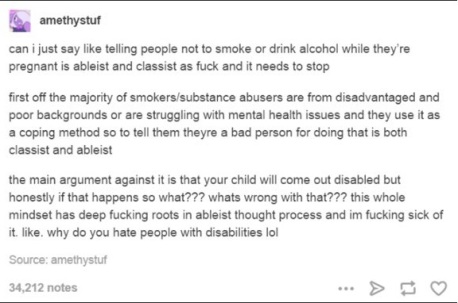A few weeks ago, I saw the same tumblr post brought up at least twice on twitter in a screenshot that was derided as “tumblr SJWs have gone too far/ these social justice warriors are off the deep end.” In a nutshell – calling the idea stupid, as if it was written by someone with no common sense.
Here is the screenshot:
I read this and immediately realized that the post, and not the people ridiculing it on a different social media platform, was correct. Sure, the original poster (OP) is using tumblr-specific language, which doesn’t translate very well into non-tumblr forms. And the OP is generalizing a lot of things and using “disabilities” as a catch-all term to include mental illnesses, addiction, and birth defects – which in a general sense might be true, but in my opinion is still too much generalization.
Regardless – OP makes a good point! It is incredibly dangerous to insist that all pregnant people must immediately stop drinking or taking whatever drugs they’re on for a number of reasons.
- If a pregnant person is dependent on drugs or alcohol and stops cold turkey, the fetus can go into shock and the person can miscarry.
- Persons who are addicted to drugs and alcohol are just that – addicted. Expecting anyone to simply not do drugs anymore is ableist, and particularly cruel to expect that of someone also dealing with normal stresses of a pregnancy. They need help, not judgement.
- The data available on babies born with drugs in their system (neonatal abstinence syndrome) is not widely researched, using bias test groups, and there haven’t even been that many studies done overall.
- The process of getting clean while pregnant is an expensive one, and treatment centers with limited space is the norm.
The other dangerous part of this line of thinking “don’t do drugs/drink while pregnant” is that it bleeds into criminalizing people more harshly because they’re pregnant. The idea that pregnant people are not allowed to have mental issues that require medication, suicidal thoughts or tendencies, substance abuse problems, or anything less than a perfect life is a dangerous one that leads to criminalizing people for so-called child abuse or fetal neglect while they’re pregnant. It’s something that’s happening now, as children born with drugs in their system are taken into custody, and their parent arrested.
I could paint you a picture of the many ways this impacts poor working people and their families, but I don’t need to – other accomplished journalists have already done that.
This is an article published in December of 2014, and was the first I read on the subject.
Here is another article that was published in November of 2015 on the same issue.
I’m not saying that anyone should do drugs while they’re pregnant (unless it’s medication for mental illness in which case, yes, you really should continue taking those, just communicate with your OB and therapist about it), but I’m not going to get mad at anyone who does. Life is hard. Addiction is hard. Pregnancy is difficult in even the best circumstances.
My point is that the focus should be on supporting pregnant people in whatever decisions they make. Don’t be condescending. Have compassion.

